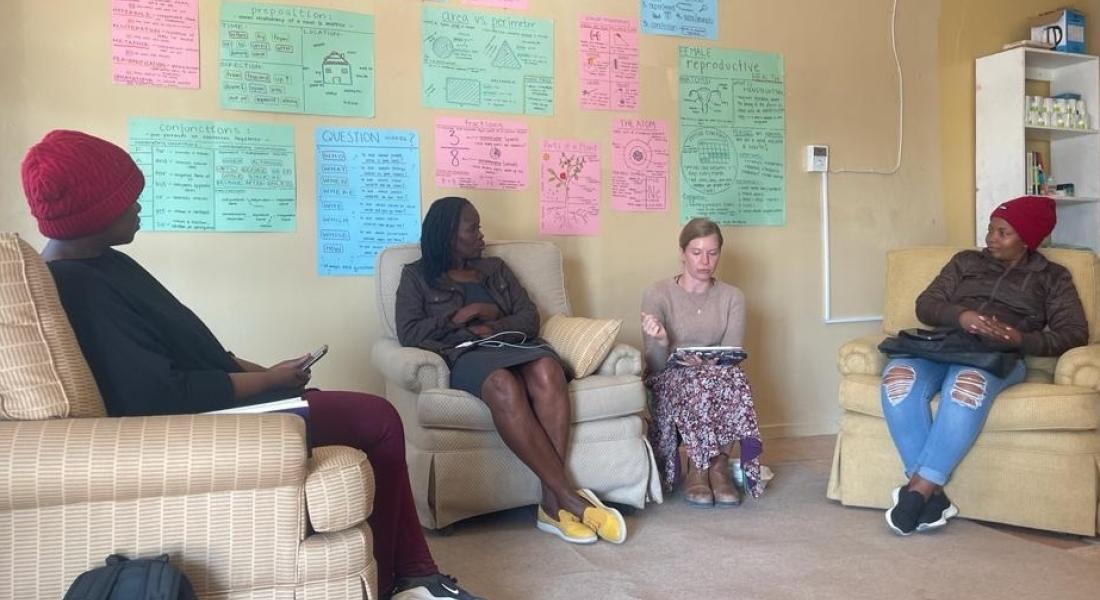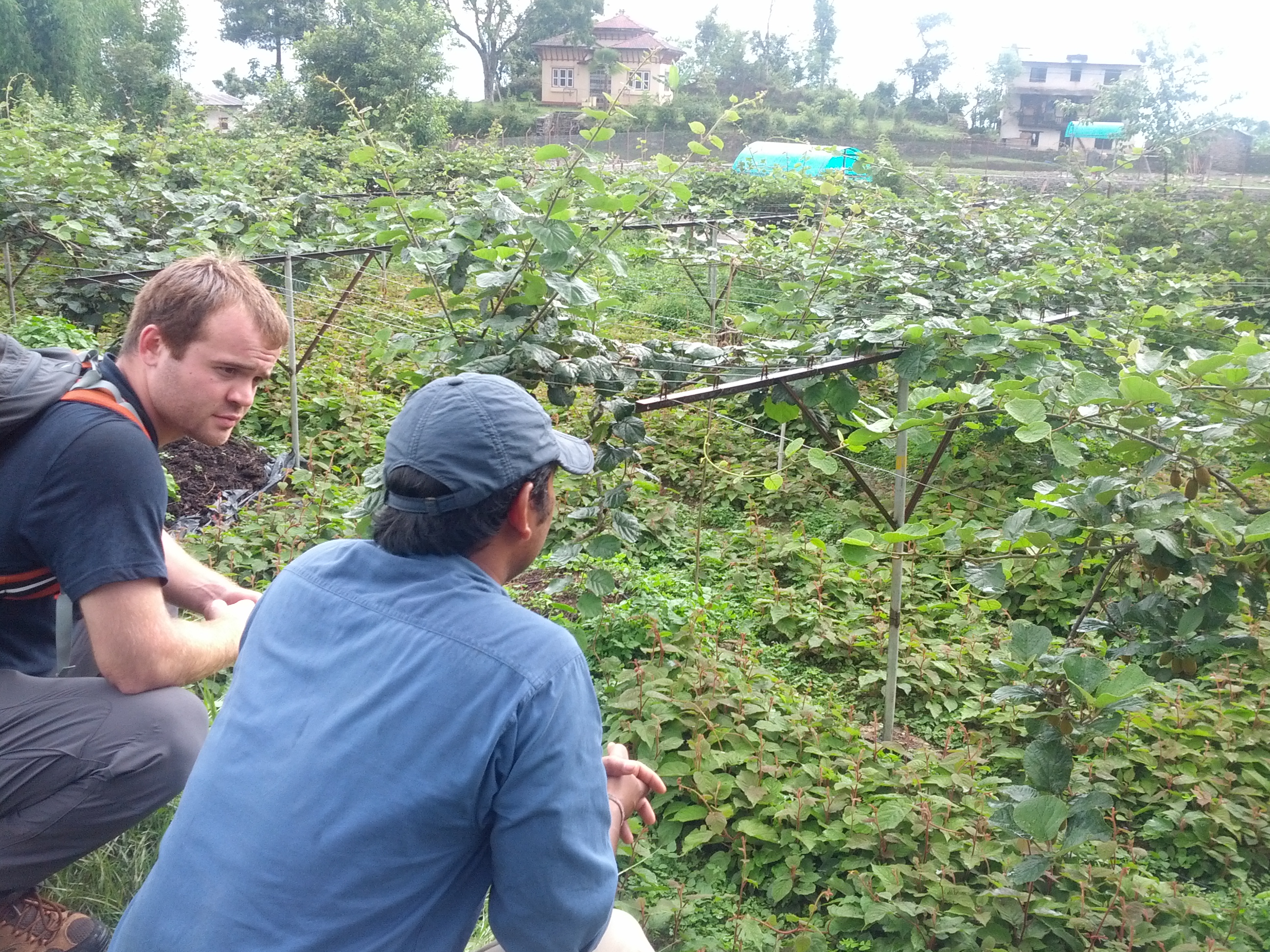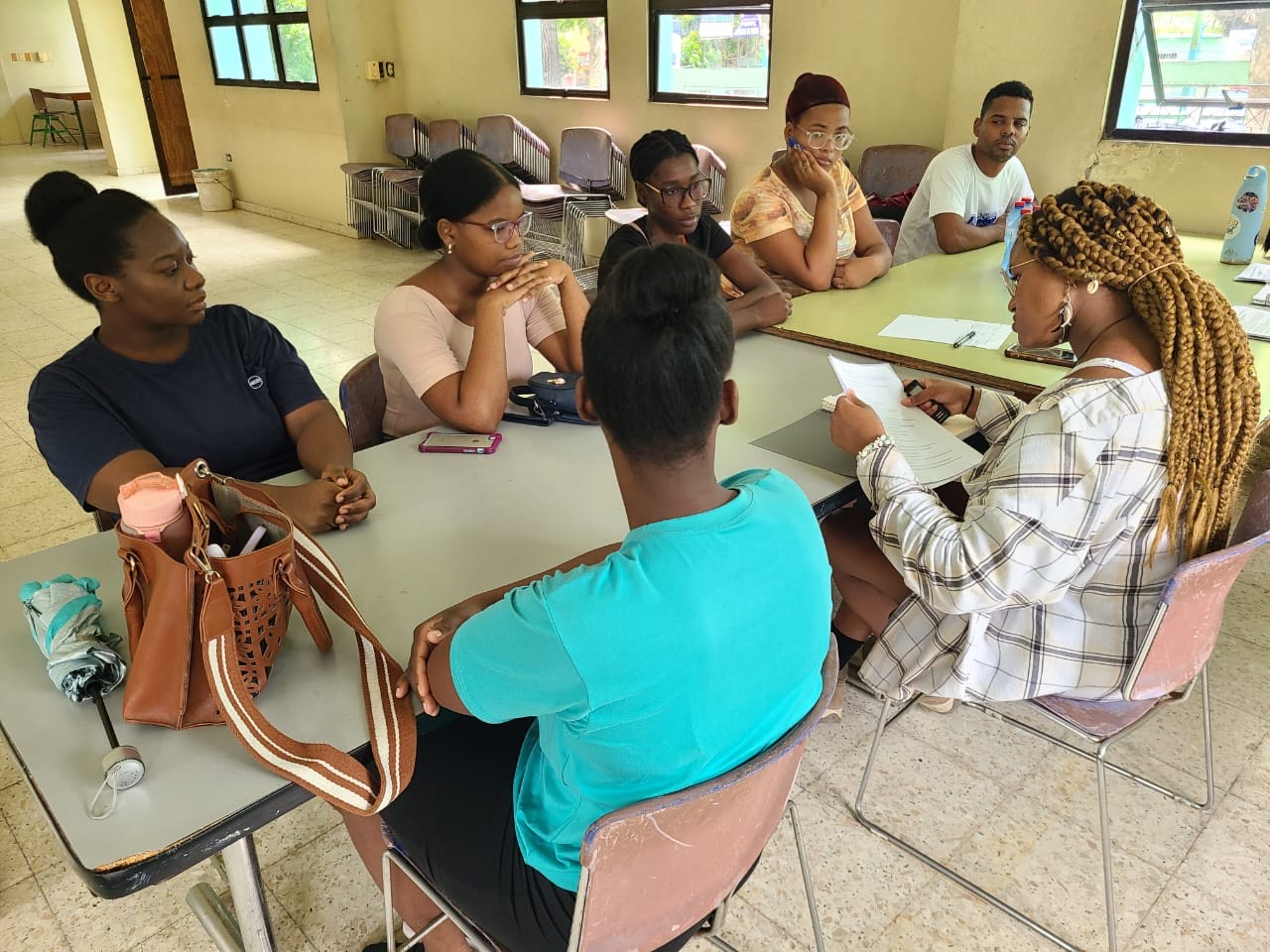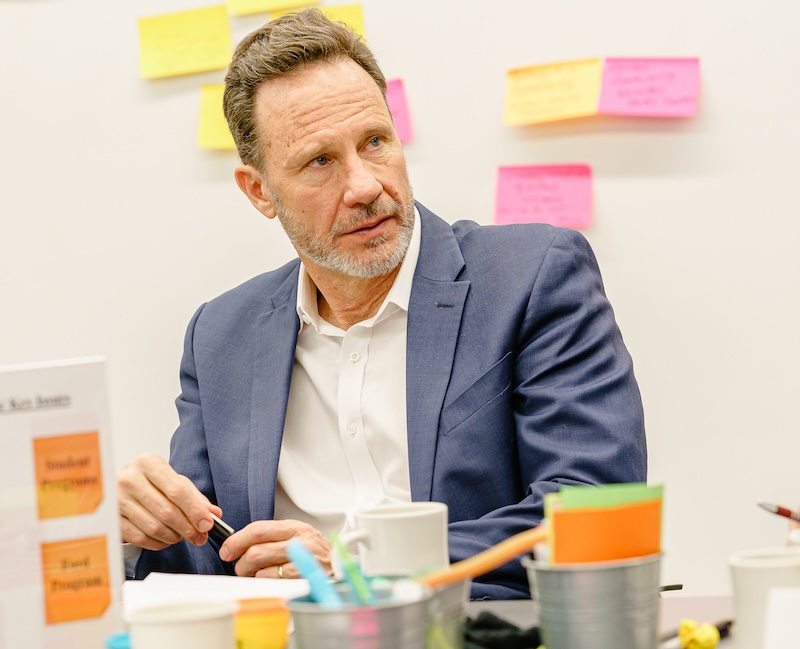
Grace Clinton is conducting interviews for her research project on postpartum care and education in Kgalagadi, Botswana.
After more than 16 years, Kellogg’s International Development Studies (IDS) minor is closing. Though the program is ending, its legacy goes on through the continued work of its alumni who are actively alleviating human suffering and increasing human flourishing in the world through their academic and professional endeavors.
“The IDS minor has been the foundation of my career in humanitarian work, including providing early warning for and responding to famine and other life-threatening food insecurity in South Sudan, post-collapse Afghanistan, Nigeria, and other countries,” says Christopher Newton ‘15, who works with the International Crisis Group.
Newton graduated with a bachelor’s degree in political science and an IDS minor and went on to attain a Master of Science in food and nutrition policy and programmes from Tufts University. Newton’s IDS fieldwork focused on conflict and development through research trips to Rwanda and Nepal and a fellowship in South Sudan.

The IDS minor equipped undergraduate students like Newton with the context and academic foundation to learn about and contribute to international development discourse and practice through serious independent research projects in Africa, Asia, and Latin America. It engaged students from many disciplines, allowing them to focus on critical issues in the areas of global health, education, the environment, refugees, and migration.
“The students in the IDS program have always been committed to transforming our societies and providing opportunities for everyone. These students were not just interested in learning how to do research, but they really wanted to help contribute to society, to change things to benefit the most vulnerable populations around the world,” says Abby Córdova, Associate Professor of Global Affairs in the Keough School and a Kellogg faculty fellow who taught the IDS capstone course.
The IDS coursework stressed to students the importance of listening to and collaborating with the communities most affected by the issues they were studying.
“Their commitment to justice, solidarity, wellbeing broadly defined, and integral human development is what motivated them to write their projects, to interact with local populations and learn from them,” says Córdova. “So much so that many of them wanted to go back and give back to the communities they worked with during the program.”
For example, recent graduate Grace Clinton ‘24 received a Samuel Huntington Public Service Award to build a women’s center in the Kgalagadi region of Botswana where she traveled as an undergraduate on a Kellogg/Kroc Research Grant to investigate postpartum care practices and education of young mothers for her IDS capstone project.
“One of the questions I asked the young mothers I worked with was, ‘If we could make anything happen, what do you need most?’ All of them said, a women’s center, a place where they could feel safe and protected. And I said, ‘Okay, we’re going to figure out how to do this,’” says Clinton, who graduated in 2024.
Clinton majored in pre-professional studies and global affairs with the IDS concentration and a minor in anthropology. She is now working on a masters of health and society at Cambridge and intends to go on to a doctorate program in medical anthropology development research.
“During IDS, I lived with a host family and got to learn a new language. It was so immersive,” says Clinton. “I learned how to write a grant proposal. I learned how to analyze and process data. They gave us such rigorous training to be ready, to be able to develop our own research projects from start to finish.”

Clinton was one of two co-chairs for the final student-led Human Development Conference (HDC) that annually provided a platform for dialogue in which students from many academic backgrounds and disciplines shared their development-focused research. Jessica Ashman ‘24 , another recent graduate who also co-chaired the 2024 conference, received a Fulbright-John Lewis Civil Rights Fellowship through which she is exploring issues related to transnational Blackness and social inclusion in Ecuador.
“It’s a transformative thing for students even just to determine what project they really care about and then to center that in what they want to do going forward,” says Kellogg Faculty Fellow and Notre Dame du Lac and Kellogg Professor of Sociology Erin Metz McDonnell, who taught the IDS research design course.
In addition to the rigorous hands-on research methods training, the minor included an introductory course on international development, two relevant electives, international fieldwork, and a final capstone course.
“The students are there on their intrinsic motivation and are grappling with some really challenging ethical and practical issues of justice when we look at the wide disadvantages that exist across the world,” says McDonnell. “It exposes them to the important and very complicated kind of thinking you have to do to try to solve social problems.”
The IDS sequence required students to examine what they really care about, immerse themselves in a different culture, build personal and professional skills, and make a real contribution in their chosen area of study. Many went on to publish the findings from their projects and further their research in those areas during graduate school and beyond.
“The IDS minor, particularly the capstone course with Rev. Robert Dowd, CSC, profoundly shaped who am I and how I approach my work,” says Emily Mediate ‘15, chief program officer at Health Care Without Harm, who studied HIV/AIDS campaigns in Uganda for her IDS project and graduated in 2015 with a Bachelor of Arts in health studies and Africana studies. Mediate also has a master’s degree in public policy and a master’s degree in global governance and diplomacy from the University of Oxford, where she attended as a Rhodes Scholar.
“My IDS courses were where I learned lifelong skills in research, development practice, and nonprofit leadership. In fact, I still reference the theory of change module from Professor Steve Reifenberg’s class in my current role at Health Care Without Harm. I’m grateful to all those who taught me during my time in the program, and to the IDS cohort for providing lifelong friendships that sustained me through my early career.”
 The IDS minor experience prepared students like Mediate for serious development work after graduation and made them very attractive to potential employers.
The IDS minor experience prepared students like Mediate for serious development work after graduation and made them very attractive to potential employers.
“They had to practice new ways of thinking and be very entrepreneurial – from developing their research questions, to fieldwork, to synthesizing and articulating what they learned into actionable insights,” says Kellogg Faculty Fellow and Senior Strategic Advisor Steve Reifenberg, who built up the IDS minor along with Kellogg Associate Director Holly Rivers and taught the intro to IDS and the elective international development in practice courses. “This kind of journey is very attractive to potential employers.”
These IDS research projects provided substantive experience beyond the typical internship available to undergraduates from which to draw on as they applied for advanced academic programs, employment, scholarships, and grants.
“This program goes beyond what most students accomplish in a summer internship, often leading to remarkable job or graduate opportunities,” says Rivers, who develops and administers all undergraduate programs including the IDS minor. “Even though it was a minor, it’s pretty incredible how many alumni are doing meaningful development work that impacts real lives across the globe.”
Though the IDS minor is no longer available, the Keough School of Global Affairs now offers a global affairs major. And the University is constantly developing new opportunities for students building upon what is learned through programs like IDS and may incorporate key components, like rigorous applied research training and international fieldwork experience for undergraduates, into future and existing programs.
“The creation of the IDS minor was an important step for the university as we considered how we might best prepare global leaders,” said University President Dowd, who originally launched the IDS minor and taught the capstone class for more than 10 years.
“We are proud of those graduates that earned the IDS minor and the important work they are doing today, and we are grateful for the institutional lessons we learned which have become the foundation for our future efforts.”
Personal reflections from alumni of the IDS minor/concentration:
"Although I am sure that the decision was not made lightly, I am so sad to hear that the IDS minor will be closing for future students. I know it had such a profound impact on my professional and personal development, and I certainly would not be the person I am today without the program. I appreciate you sharing the article with me because it really did a wonderful job encapsulating the impact that IDS had on me and so many others."
Nathaniel Cieplik '23
Medical School; University of Pennsylvania
"The opportunities that IDS allowed me were some of my most formative at Notre Dame and certainly had a bigger impact on where I am and what I want to do than any other experience. I think that my classmates and I were formed in a very unique way by going out into the field, and though at times it felt like jumping into the deep end, it was an experience I look back on incredibly fondly. I have no doubt that I would not be in the position I am in, or be as successful at what I am doing, if it were not for you and the other faculty within International Development Studies."
Patrick Enochs '23
Research Assistant; Center for Naval Analyses
"My IDS minor classes and the experiences they brought were a highlight of my time at Notre Dame. I learned so much real-world, practical knowledge that I continue to build on today, specifically in my classes on Global Health, Research Methods, and Political Economy. The capstone experience was also a great learning opportunity, as it allowed me to build on my ISSLP experience in Peru and taught me to conduct research. Lastly, I am incredibly thankful to having met Professors Reifenberg and Donahue – both of whom gave me valuable mentorship and guidance that was instrumental in getting me into medical school."
Diego García '21
Medical School; University of Arizona
"This feels like the end of an era. I’m so grateful for my experience in IDS and glad that at least some part of it will be available for students as part of the Global Affairs program."
Laura Hernandez '19
Strategy Manager, Accenture
"It's very sad to hear that future Notre Dame students won't have the same life-changing opportunities that I did through the IDS concentration, and I hope that the Kellogg Institute is still able to find ways to engage students in International Development. The IDS minor and Kellogg Undergraduate Research Grant that allowed me to spend a summer at the Bethany Land Institute changed the course of my life, and I certainly would not have ended up in Teach For America post-grad and eventually back here in South Bend at the Robinson Center without the invaluable exposure to education I gained during my IDS Capstone Project. I'll forever be grateful to you, Rachel, all of my IDS professors, and everyone else involved in the minor for providing me with so many incredible learning opportunities throughout my time in the program."
Ryan Murdock '23
Outreach & Volunteer Coordinator; Robinson Community Learning Center
"I am so sad to hear the IDS minor is closing!! It was such an influential part of my education at Notre Dame."
Anne Sescleifer '15
Resident; University of Maryland Medical Center
"The IDS minor was truly the highlight of my academic experience at Notre Dame, and I'm so grateful for the opportunities I was given to travel and research critical international issues through the program."
Tatiana Silva '21
Master's of Biotechnology student; Georgetown University
"While I'm sad to hear about the wind down for the IDS program, I'm sure you and the rest of the team will continue to make a huge impact for students, the university, and the communities that the program sought to serve. Thank you for everything you did for the program and students like me."
D. Alex Wood '14
Managing Director, Strategy; KPMG
"I am sad to hear about the closing of this chapter, but I am so grateful for all the lessons and opportunities I encountered during my IDS time."
Kara Ryan Yao '13
General Anesthesiologist; Children's Hospital of Philadelphia





